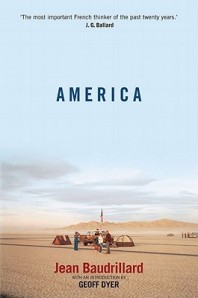I’m a big Jean Baudrillard fan: Simulacra and Simulation, which I’ll be writing an essay on soon (tying his notion of hyper-reality to our modern mass media fixated and technocentric culture), is one of my all time favorite works of modern philosophy. I’m also a big fan of travelling, so when I spied Baudrillard’s slim tome America, I figured I might as well check it out. While I didn’t especially love the book, it was an interesting (and fairly easy) read. As I sit here in very rural Northern Florida taking in yet another slice of my home country, I can’t help but view the surrounding culture as an amateur anthropologist might, and the surrounding ecosystem as an amateur biologist might. But how can I satisfy my inner philosopher? Baudrillard obviously ran into the same wall. Anyway, below is my review of America the book, which is Baurillard’s review of America the country.
“America” is an exercise in mental masturbatory travel-logging, if ever one were written. Still, it’s an interesting, abstract prose poem on Baudrillard’s experience of the United States in the 1980s. There are some great ideas and aphorisms hidden within its pages:
- on the “limitless” horizontally sublime deserts (as well as the cities imposed upon them, like LA); the “hologram” of American uniformity (see: suburbs);
- the detachment from origins (especially in the West);
- the “mindless luxury” of American consumption, the gratuitous nature of which contrasts with our aloneness (“There is nothing more mysterious than a TV set left on in an empty room”);
- the car centered society (“Drive ten thousand miles across America and you will know more about the country than all the institutes of sociology and political science put together.”);
- a “Fourth World” in the making from new disenfranchisement, the ultimate distinction from Utopia, now that the third world, no longer mourned, “has been obliterated”;
- Reagan’s reign, still romanticized very strongly within the U.S. today, as being hysteresis — steeped in inertia;
- the transition from America as a world power to a world model (which I think will continue more and more with the rise of burgeoning economies like China following the American neoliberal economic model to some degree);
- and the contrast between Europe (based in old ideals, such as aesthetics and social contracts, but also cognizant of newer ideals like Marxism) and America (“Utopian and pragmatic,” occupying the 19th century ideal, detached from European origins and modern developments — frozen in the era that birthed the ideal of progress).
America: the “brutally naïve,” informally conformist “centre of the world,” the egalitarian (which I beg to differ) and the indifferent (which I think depends almost entirely upon the locale) — Americans: the last “primitive” people, in part because they lack awareness of their own simulations, for Baudrillard sees America as embodying hyperreality, and “Utopia achieved”. I take issue with Baudrillard ignoring the social and ecological aspects of America and instead seemingly romanticizing (in his own way), and certainly idealizing, its automotive-obsessed and violent society with a string of abstractions, without recognizing the real world consequences of these features of American life. He doesn’t bother to justify many of his assertions, taking his views as a matter of fact about the telic nature of civilization, of which America is both detached from and a direct result of, the Utopia that will be the upending of the world. However, there are so many ways to explore this notion using concrete data and observations! The ethical and environmental crises stemming from the root of America’s modern tradition, materialistic consumption, could be explored, to a degree supporting Baudrillard’s views, although not his whimsical attitude toward American eccentricity (I suppose that’ll always be a matter of perspective).
I’m also surprised Baudrillard didn’t wax theoretical about the origins of the American hyperreal more: the overwhelming influence of mass media like film and TV, localized not only to Los Angeles but the country, as a grand unifying force. And now we have the Internet, and the distinctions are disappearing even more by the day, as America morphs into an incredibly diverse but still somewhat homogenous blob, united by our nationality as a conditional, but moreover by our shared mass culture — even the most elité among us knows who Brad Pitt is, yet relatively few can name those holding the highest positions in the vestiges of American politics and economics (like, say, Supreme Court justices), or who the great writers of our age are. The hyperreality of TV / film and online social media has exploded, not to mention American soft power overtaking the globe — perhaps Baudrillard’s legacy should be continued in this arena…
The book fails in the same areas as much of post-modern philosophy: overtly subjective, head-in-the-clouds observations fused into theories. ‘We all hold our own subjective perspectives, so why bother with the fallaciously objective?’ I call bullshit — there’s still room for empirical fact. “America” could succeed best with the genealogical methodology of Foucault fused with a modern sociologist’s lust for hard data and the contemporary datum in the context of methodological biases, though I honestly expect too much of the ideal portrait of the United States. What we’re left with is an interesting evening read about the “centre of the world,” a country I, in equal parts ignominious and proud, call home, from the perspective of a crazy French theorist. And of course, I’m left with my favorite sentence from the book (and possibly from any writing about my homeland): “Americans may have no identity, but they do have wonderful teeth.”
